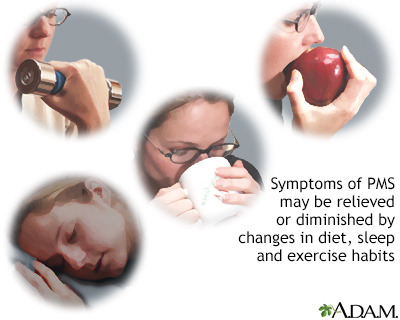Premenstrual syndrome (PMS)

Premenstrual syndrome (PMS) refers to a group of physical and behavioral symptoms that can occur in a cyclical pattern during the second half of the menstrual cycle. Premenstrual dysphoric disorder (PMDD) is a severe form of PMS.
What causes PMS?
The exact cause of PMS is not well understood, but it is believed to be related to hormonal fluctuations that occur during the menstrual cycle, particularly changes in estrogen and progesterone levels. These hormonal shifts may affect neurotransmitters in the brain, such as serotonin, which can influence mood and other symptoms.
How does PMS start?
PMS symptoms typically begin one to two weeks before the start of a woman's menstrual period and resolve within a few days after the period begins. The severity and duration of symptoms can vary from one cycle to another and may change throughout a woman's life.
What are the symptoms of PMS?
PMS symptoms can include mood swings, irritability, depression, anxiety, bloating, breast tenderness, headaches, fatigue, food cravings, and changes in sleep patterns. The severity and combination of symptoms can vary among individuals and may change over time.
How is PMS diagnosed?
PMS is diagnosed based on the presence of characteristic symptoms that occur in the days leading up to a woman's menstrual period and resolve shortly after the period begins. A healthcare provider may ask the patient to track their symptoms and menstrual cycles for several months to confirm the diagnosis.
How can PMS be treated?
Treatment for PMS may include over-the-counter pain relievers, hormonal contraceptives, antidepressants, or anti-anxiety medications, depending on the severity and type of symptoms. Lifestyle changes, such as regular exercise, a balanced diet, and stress reduction techniques, can also help alleviate PMS symptoms.
What complications may occur with PMS?
In some cases, PMS can significantly impact a woman's daily life and may lead to difficulties in relationships, work, or school. Severe PMS symptoms may be an indication of a more serious condition called premenstrual dysphoric disorder (PMDD), which requires medical intervention.
How can I prevent PMS?
While it may not be possible to completely prevent PMS, certain lifestyle changes can help reduce the severity of symptoms. These include regular exercise, maintaining a healthy diet, managing stress, and getting adequate sleep.
Long-term management of PMS
Long-term management of PMS involves identifying and addressing the specific symptoms that cause the most distress and adopting healthy lifestyle habits to minimize their impact.
What is recent research saying about PMS?
Recent research has focused on understanding the underlying causes of PMS, including the role of hormonal fluctuations and neurotransmitters in the brain. New treatment options, such as selective serotonin reuptake inhibitors (SSRIs), have shown promise in managing PMS symptoms more effectively.
Where can I go for more information on PMS?
For more information on PMS, consult your healthcare provider or visit reputable websites like the Office on Women's Health or the American College of Obstetricians and Gynecologists.

